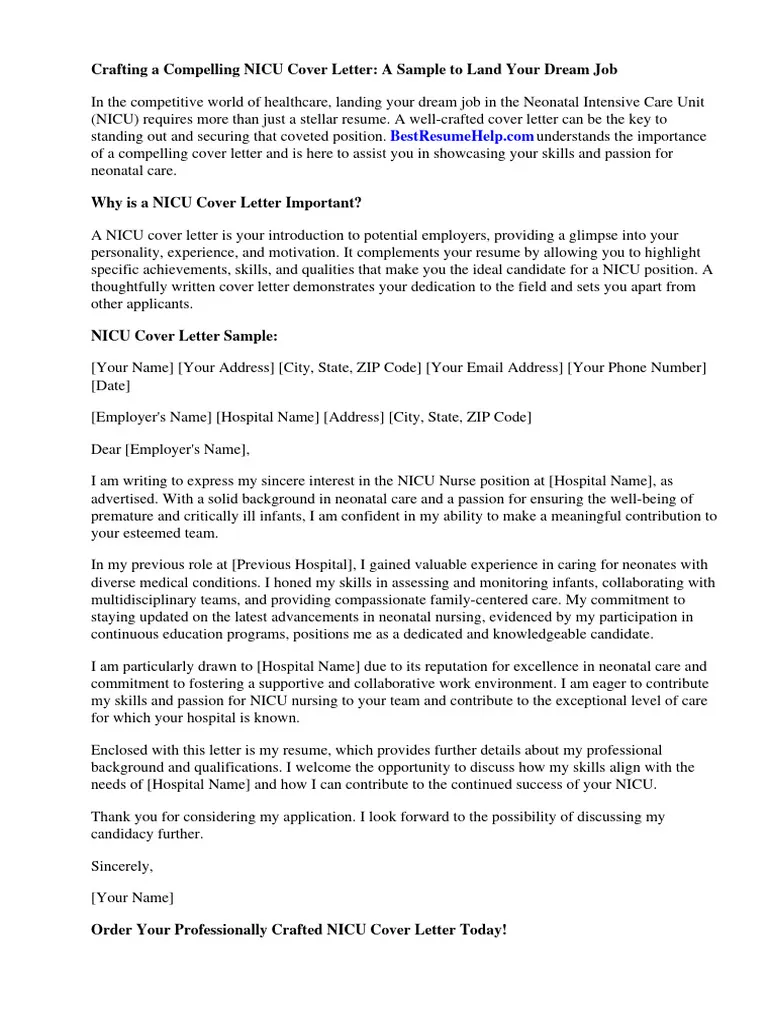What is an ICU Cover Letter?
An ICU cover letter is a crucial document that accompanies your resume when applying for a nursing position in an Intensive Care Unit. It serves as your first introduction to the hiring manager, offering you a chance to showcase your skills, experience, and passion for critical care nursing. Unlike a resume that presents a factual overview, the cover letter allows you to personalize your application, articulating why you are the ideal candidate and how your aspirations align with the specific ICU’s needs. It’s your opportunity to make a compelling case, highlighting your suitability for this challenging yet rewarding field. Remember, a well-crafted ICU cover letter is not merely a formality, but a potent tool for setting you apart from the competition and increasing your chances of securing an interview.
Why is an ICU Cover Letter Important?
The importance of an ICU cover letter stems from its ability to provide context and depth that a resume alone cannot convey. In a competitive field like critical care nursing, where the demands are high and the stakes are even higher, a cover letter allows you to demonstrate a genuine interest in the specific ICU and the unique challenges it presents. It’s an opportunity to explain any career transitions, address potential gaps in your experience, and articulate your motivations for working in the ICU. A well-written cover letter will show your understanding of the ICU environment, your ability to collaborate effectively with a multidisciplinary team, and your commitment to providing exceptional patient care. It helps the hiring manager understand not only your qualifications but also your personality, work ethic, and passion for the role. Consequently, it significantly increases your chances of getting noticed, leading to an interview and, ultimately, your dream job.
Essential Components of an ICU Cover Letter
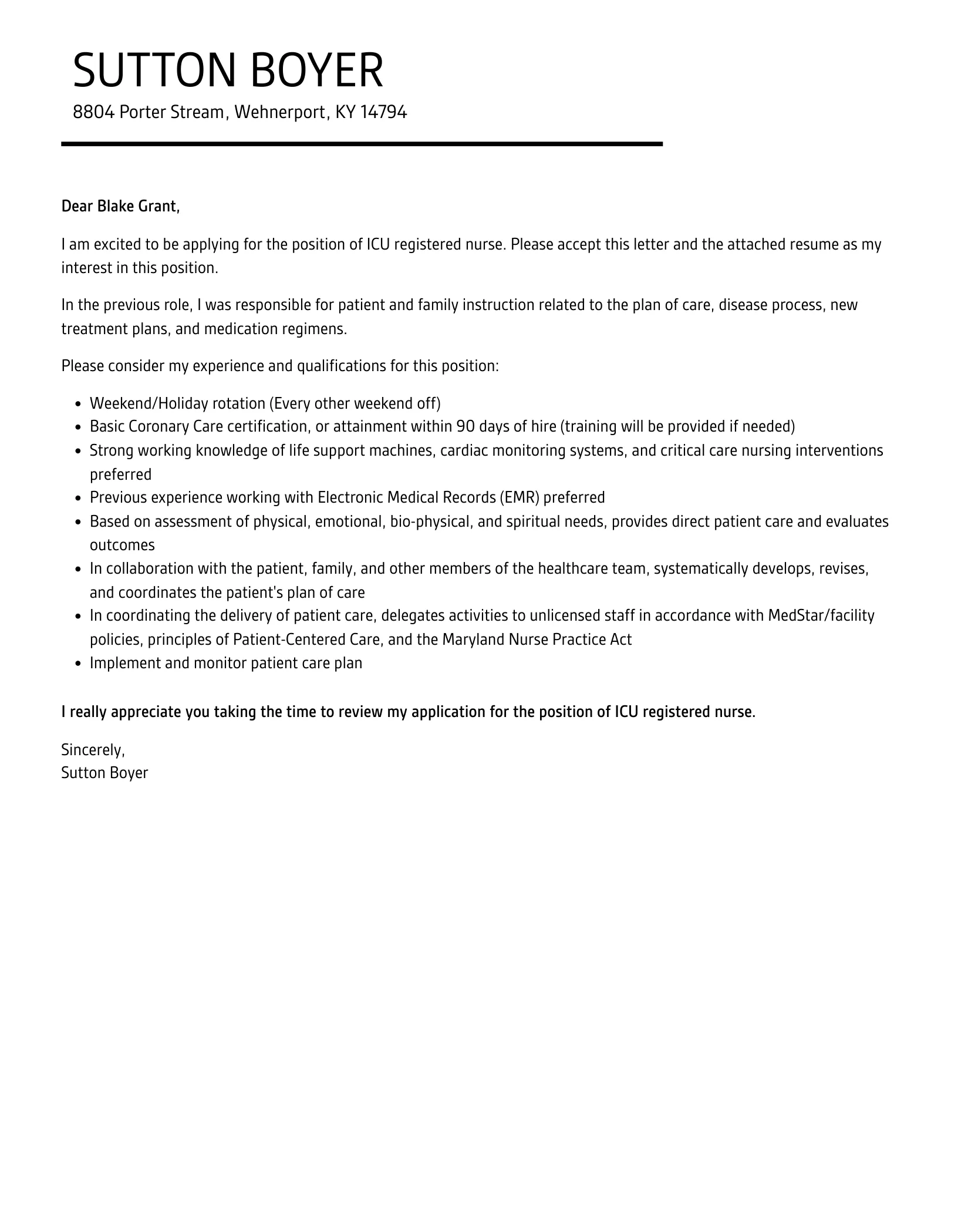
A strong ICU cover letter comprises several key components that work together to present you as a highly qualified candidate. These elements, when combined, create a cohesive narrative that captures the attention of the hiring manager and highlights your suitability for the role. Each section plays a specific role in selling your capabilities and potential, leading to a positive impression. Ensure your letter includes each of the following components, paying attention to details and customizing content to the particular job and ICU.
Contact Information
At the top of your ICU cover letter, clearly state your full name, address, phone number, and professional email address. This makes it easy for the hiring manager to contact you. Ensure that your email address is professional and appropriate. Double-check that your phone number is correct and that your voicemail is set up professionally, as this is often the first point of contact.
Professional Salutation
Address the hiring manager or the appropriate person by name. If you don’t know the name, research the hospital website or LinkedIn. Using the correct name shows that you’ve taken the time to personalize the letter. If you are unable to find a name, a general salutation like ‘Dear ICU Hiring Team’ is acceptable. Avoid generic greetings like ‘To Whom It May Concern’ because it signals a lack of effort.
Introduction Expressing Your Interest
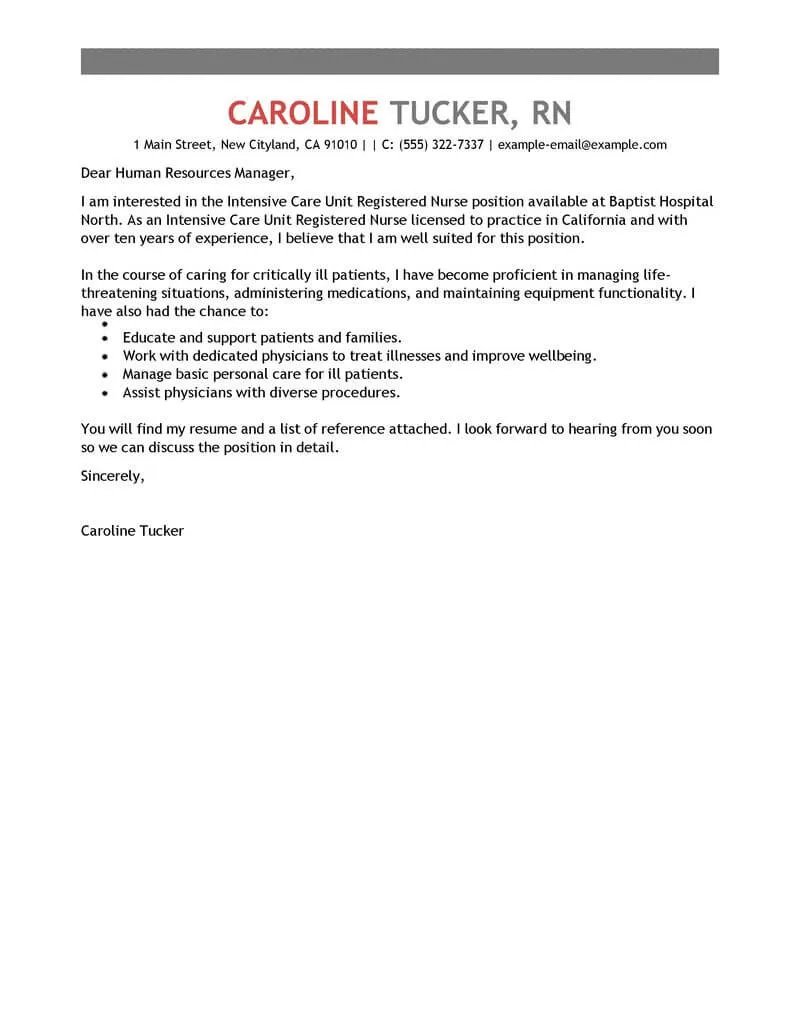
Start your letter by clearly stating the position you are applying for and where you saw the job posting. Immediately express your interest in the role and the ICU. Briefly mention what makes you interested in working in critical care. This introduction should be concise, enthusiastic, and focused on the specific job and hospital.
Highlighting Your Skills and Experience
The body of your letter should showcase your most relevant skills and experience. Tailor this section to the specific requirements of the ICU position. Provide concrete examples of your accomplishments and how your skills align with the needs of the unit. Quantify your achievements whenever possible to demonstrate your impact.
Relevant Clinical Experience
Detail your clinical experience that is relevant to the ICU setting. This includes experience with specific patient populations, procedures, and technologies commonly used in ICUs. Mention any certifications, training, or specializations that are applicable to critical care nursing, such as ACLS, CCRN, or critical care courses. Be specific about the units you have worked in and the types of patients you have cared for.
Transferable Skills
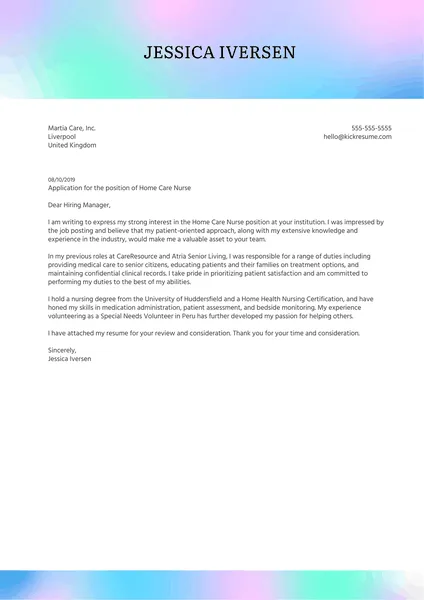
Highlight the transferable skills that are essential for ICU nursing. These include critical thinking, problem-solving, communication, teamwork, and the ability to remain calm under pressure. Provide examples of how you have demonstrated these skills in previous roles. The ability to effectively manage a crisis, communicate clearly with families, and coordinate care with various healthcare professionals is highly valued in the ICU setting.
Quantifiable Achievements
Whenever possible, quantify your achievements to demonstrate the impact you’ve made in previous roles. For example, mention how you improved patient outcomes, reduced medication errors, or contributed to a positive patient experience. Provide specific numbers or percentages to support your claims. This helps the hiring manager understand the tangible value you can bring to their ICU.
Demonstrating Your Understanding of ICU
Show that you understand the challenges and responsibilities of working in an ICU. This section should include your awareness of the specific types of illnesses, conditions, or patients the ICU cares for. Demonstrate that you possess the necessary knowledge and skills to thrive in this environment, including knowledge of ventilators, critical care medications, and advanced monitoring techniques. It shows the hiring manager that you are prepared for the demands of the role.
Researching the ICU Environment
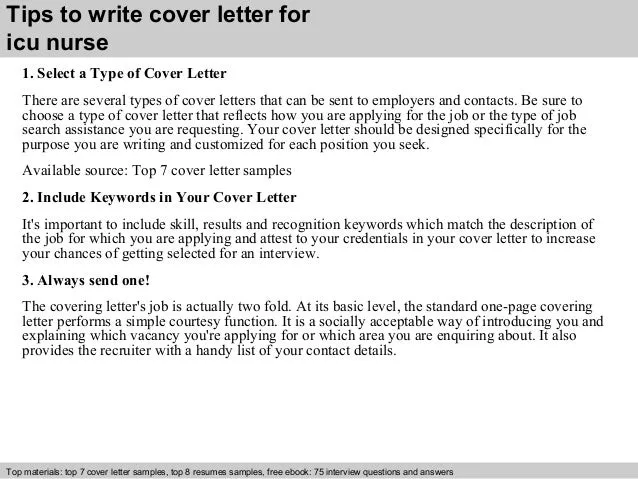
Before writing your cover letter, research the specific ICU where you are applying. Learn about its mission, values, patient population, and any special programs or initiatives it may have. Referencing this information in your letter demonstrates your genuine interest and that you have taken the time to learn about the unit. This includes information available on the hospital’s website or by speaking with current or former employees.
Tailoring Your Letter to the Specific ICU
Customize your cover letter for each ICU application. Generic letters are easily recognized and often discarded. Tailor your content to match the specific requirements of the job description. Highlight the skills and experiences that are most relevant to the position. This will signal to the hiring manager that you are serious about this opportunity and are a good fit for the unit.
Expressing Your Enthusiasm and Fit
In the closing paragraphs, express your enthusiasm for the role and the opportunity to contribute to the ICU team. Reiterate your interest in the position and the hospital. Mention how your skills and values align with the unit’s goals and culture. Express your eagerness to learn and grow within the ICU. Show that you are a team player and are passionate about providing excellent patient care.
Closing the Letter
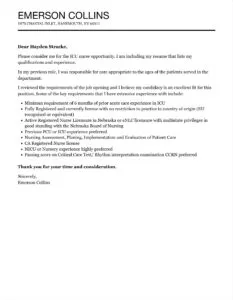
The closing of your ICU cover letter is just as important as the introduction. It provides a final opportunity to leave a lasting impression. Make sure your closing is professional, polite, and reinforces your interest in the position. It also gives you the chance to thank the reader for their time and consideration.
Formal Closing and Signature
Use a formal closing such as ‘Sincerely,’ ‘Respectfully,’ or ‘Best regards’. Leave space for your handwritten signature if you are submitting a hard copy, or type your full name below the closing. This adds a professional touch and indicates that you’ve carefully reviewed and approved the letter before submission. Make sure your signature is legible and easy to read. This step completes the professional format.
Review and Proofread Your Letter
Before sending your ICU cover letter, thoroughly review and proofread it for any errors. This is a crucial step. Check for grammatical errors, spelling mistakes, and any inconsistencies in formatting. Ensure your letter is easy to read and flows logically. A polished, error-free cover letter demonstrates your attention to detail and professionalism, which are essential qualities for an ICU nurse. A poorly written letter can give the impression that you are not detail-oriented or professional, which may affect your chances of getting hired. Ask a friend, mentor, or career counselor to review your letter for you to catch any errors you may have missed.
Formatting and Presentation
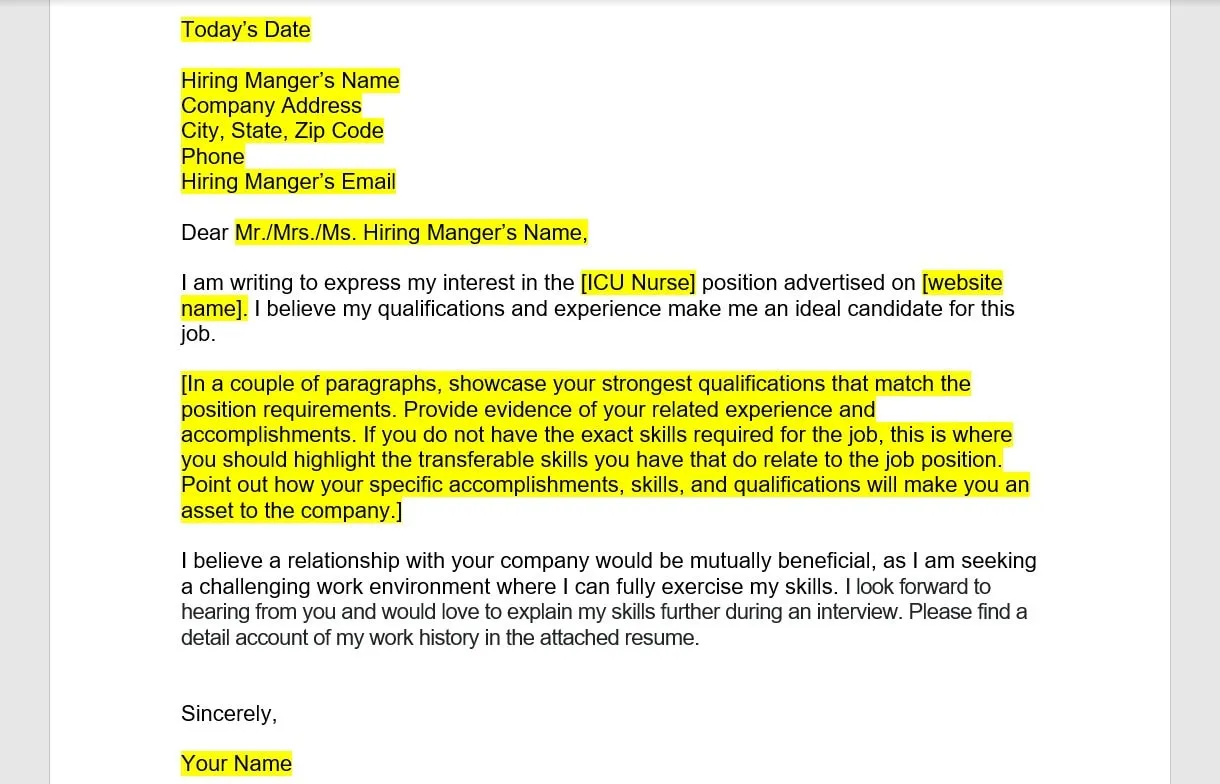
Pay close attention to the formatting and presentation of your ICU cover letter. Use a professional font such as Times New Roman, Arial, or Calibri, and use a standard font size (11 or 12 points). Ensure your letter is well-organized with clear headings and bullet points to make it easy to read. Use consistent spacing and margins throughout the document. Ensure your cover letter is well-structured with consistent formatting and a professional presentation to make it easy to read. Your letter should be visually appealing and free of any clutter, which makes it easier for the hiring manager to focus on the content.
Proofreading for Errors
Thorough proofreading is essential. Carefully check for grammatical errors, spelling mistakes, and punctuation errors. Incorrect grammar and typos can detract from your professionalism and make a poor impression. Read the letter aloud to yourself to catch any awkward phrasing or sentence structure. Consider using grammar and spell-check tools, but also rely on your own careful review. Ask a trusted colleague, friend, or family member to proofread your letter as well, as a fresh pair of eyes can often catch errors you may have missed.
Key Takeaways for ICU Cover Letter
In conclusion, a well-crafted ICU cover letter is a critical component of your application. It allows you to highlight your unique skills, experiences, and passion for critical care nursing. By following these guidelines, you can create a cover letter that impresses hiring managers and increases your chances of securing an interview. Remember to tailor your letter to each position, proofread meticulously, and express your enthusiasm. Taking the time to write a thoughtful and personalized ICU cover letter is a worthwhile investment in your career. It showcases your interest, qualifications, and dedication. It will position you as a strong candidate for this rewarding nursing specialty. Always be honest, enthusiastic, and professional.
